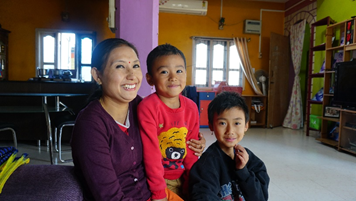India
- History
- Our Work
- Transforming Development Through Innovation & Partnership
- U.S.-India Triangular Cooperation
- Partnership for Energy Access and Security
- Partnership for Sustainable Forests in India
- Partnerships for Health
- Partnership for Education
- Partnership for Water Sanitation and Hygiene (WASH)
- Partnership for Food Security
- Partnership for Gender Equality
- Investing in Afghanistan
- Foreign Assistance Data
- Newsroom
- Newsletters and Fact Sheets
- Speeches
- Resources For Implementing Partners (RFIP)
- Careers
- Partnership Opportunities
- Success Stories
Speeches Shim

It’s 2:00 p.m. and Ranita Maibam has just returned from a 10-hour shift caring for people with suspected COVID-19 infections. She has just enough time to tend to her two children, husband, and elderly mother-in-law before she begins her next shift at 9:00 p.m.
Maibam is a Community Health Officer (CHO) at a Health and Wellness Center (HWC) in the northeastern Indian State of Manipur. She is one of thousands of health workers around the country who are working around the clock to contain COVID-19.
Maibam began her work long before COVID-19 was a threat in India or cases had been identified in Manipur. In February, she started raising awareness about the virus in the community served by her HWC. She conducted hand-washing demonstrations, explained how COVID-19 is transmitted, and distributed soap to the community. She also conducted awareness sessions at a large local market run by women and taught them how to make face masks. But it wasn’t enough. “When I heard about coronavirus, I started looking for information on Google and downloaded some material from the Ministry of Health and Family Welfare to increase awareness on what preventive measures can be taken. However, I felt I needed more knowledge to do my job even better,” she explains.
To help fill this gap, USAID’s community health systems strengthening project, NISHTHA, implemented by Jhpiego, conducts virtual training for CHOs, providing them with accurate and standardized information on preventive measures, myths and misconceptions, and a demonstration of handwashing techniques and coughing etiquette. The project also developed a learning resource package, with job-aids, videos, and other resource materials for the CHOs to use in their communities, teaching them how to care for others as well as themselves. “The training gave me a platform to ask questions and dispel my own myths related to the coronavirus. I especially found the part on ‘roles and responsibilities of a CHO’ very useful,” explains Maibam.
At the end of her long night shift, Maibam’s enthusiasm to serve her people and her community is palpable. She remains positive and is prepared to put her own life at risk to serve those around her. “I cannot stay at home because I am a health worker, but you can help me by staying at home and reducing the spread of infection. In these trying times, when there is also a shortage of supplies, small steps by the community can help me help them better,” says Maibam with a smile.

Comment
Make a general inquiry or suggest an improvement.